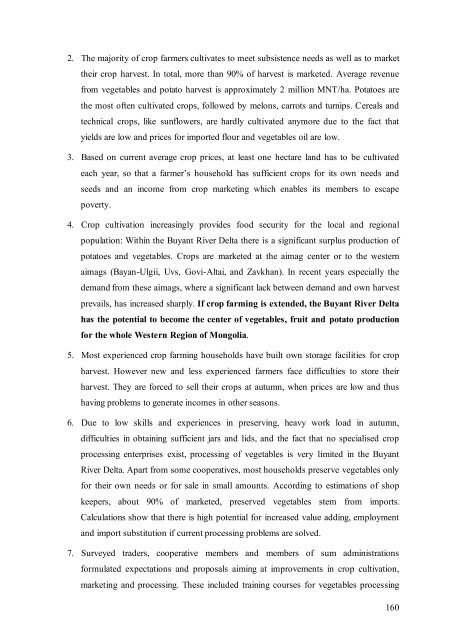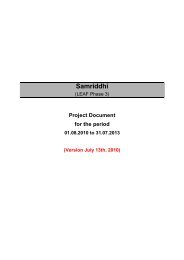FINAL REPORT
FINAL REPORT
FINAL REPORT
Create successful ePaper yourself
Turn your PDF publications into a flip-book with our unique Google optimized e-Paper software.
2. The majority of crop farmers cultivates to meet subsistence needs as well as to market<br />
their crop harvest. In total, more than 90% of harvest is marketed. Average revenue<br />
from vegetables and potato harvest is approximately 2million MNT/ha. Potatoes are<br />
the most often cultivated crops, followed by melons, carrots and turnips. Cereals and<br />
technical crops, like sunflowers, are hardly cultivated anymore due to the fact that<br />
yields are low and prices for imported flour and vegetables oil are low.<br />
3. Based on current average crop prices, at least one hectare land has to be cultivated<br />
each year, so that a farmer’s household has sufficient crops for its own needs and<br />
seeds and an income from crop marketing which enables its members to escape<br />
poverty.<br />
4. Crop cultivation increasingly provides food security for the local and regional<br />
population: Within the Buyant River Delta there is a significant surplus production of<br />
potatoes and vegetables. Crops are marketed at the aimag center or to the western<br />
aimags (Bayan-Ulgii, Uvs, Govi-Altai, and Zavkhan). In recent years especially the<br />
demand from these aimags, where a significant lack between demand and own harvest<br />
prevails, has increased sharply. If crop farming is extended, the Buyant River Delta<br />
has the potential to become the center of vegetables, fruit and potato production<br />
for the whole Western Region of Mongolia.<br />
5. Most experienced crop farming households have built own storage facilities for crop<br />
harvest. However new and less experienced farmers face difficulties to store their<br />
harvest. They are forced to sell their crops at autumn, when prices are low and thus<br />
having problems to generate incomes in other seasons.<br />
6. Due to low skills and experiences in preserving, heavy work load in autumn,<br />
difficulties in obtaining sufficient jars and lids, and the fact that no specialised crop<br />
processing enterprises exist, processing of vegetables is very limited in the Buyant<br />
River Delta. Apart from some cooperatives, most households preserve vegetables only<br />
for their own needs or for sale in small amounts. According to estimations of shop<br />
keepers, about 90% of marketed, preserved vegetables stem from imports.<br />
Calculations show that there is high potential for increased value adding, employment<br />
and import substitution if current processing problems are solved.<br />
7. Surveyed traders, cooperative members and members of sum administrations<br />
formulated expectations and proposals aiming at improvements in crop cultivation,<br />
marketing and processing. These included training courses for vegetables processing<br />
160
















